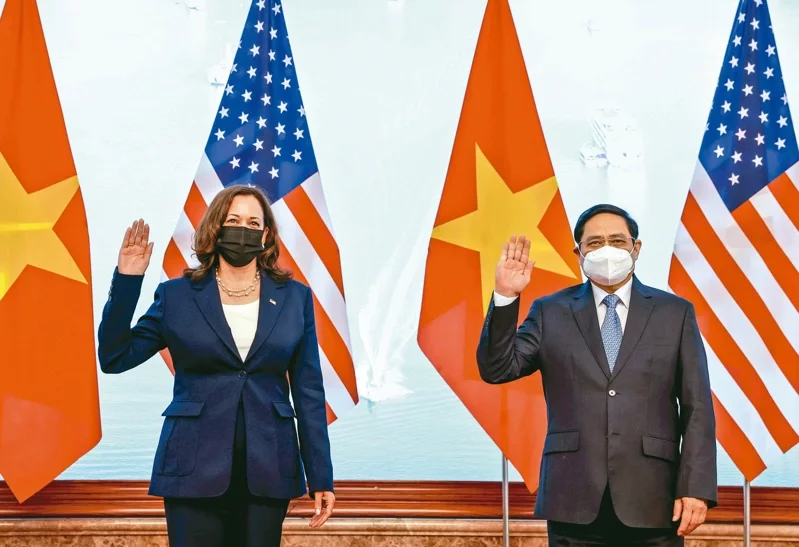
Vice President Kamala Harris concluded her visits to Singapore and Vietnam on Aug. 26. The ruling Democratic Progressive Party of Taiwan and the Liberal Democratic Party of Japan held a “two plus two” virtual conference on Aug. 27. These two seemingly unrelated activities actually have something in common.
Harris declared that the purpose of her visits was to elaborate on the U.S. vision for the Indo-Pacific region. In fact, the real objective of the United States is to unite its Asian allies against the Chinese Communist forces. The Taiwan-Japan video conference, held ostensibly to strengthen the relationship between Taiwan and Japan, is in fact pointing the sword at China, in an effort to jointly counter the Chinese Communist Party.
In a speech in Singapore on Aug. 24, Harris emphasized that U.S. engagement with Southeast Asia and the Indo-Pacific region was not directed against any one country, nor was it intended to make anyone choose a side. This is standard diplomatic rhetoric, and diplomatic rhetoric often must be interpreted as saying the opposite in order to unveil the true meaning. While Harris emphasized that U.S. engagement was not directed at any particular country, she was, in fact, was alluding to the Chinese Communist Party; although she asserted that the U.S. was not forcing anyone to choose a side, she was actually reminding, and asking, regional countries to be pro-U.S., anti-China.
Harris stated that the U.S. was willing to stand with its allies and partners to face the threat of China together. However, the United States is not likely to realize its expectations because Southeast Asian countries border mainland China, and it is difficult for them to break away with respect to contact between people, the sharing of resources and exchange when it comes to the economy and trade. It is precisely because of this geopolitical connection that the CCP exerts great influence in Southeast Asia. Case in point: On the same day that Harris arrived in Vietnam, Vietnamese Prime Minister Pham Minh Chinh met with Xiong Bo, the Chinese ambassador to Vietnam, and stressed that Vietnam would not form an alliance with any country directed against other powers.
In an effort to bring Vietnam into its fold, the U.S. has donated an additional 1 million doses of COVID-19 vaccine to Vietnam, which arrived 24 hours later. Harris also announced a five-year, $36 million grant through the U.S. Agency for International Development to help Vietnam accelerate its transition to clean energy. However, after the meeting between Vietnamese President Nguyen Xuan Phuc and Harris on Aug. 25, the official state-run Vietnam News Agency issued a press release, emphasizing that Phuc had reiterated Vietnam’s insistence on pursuing an independent, autonomous foreign policy. It is tantamount to telling the United States that it will not become an enemy of the Chinese Communist Party for the sake of getting on America’s good side.
At a time when the withdrawal of U.S. troops from Afghanistan has raised international doubts about U.S. commitment and stature, it is clear that Harris’ visit was intended to strengthen the confidence of Southeast Asian countries in the United States. The visit to Vietnam, however, brought back memories of the United States’ abandonment of South Vietnam and its hasty withdrawal from Saigon.
The events in Afghanistan have damaged America’s reputation, and Southeast Asian countries are reluctant to make enemies of the Chinese Communist Party. In particular, Singapore Prime Minister Lee Hsien Loong has always advocated a “pro-U.S. but not anti-China” policy, and insisted on not choosing sides between the two powers. Harris came a long way to get here, but it will likely remain difficult to persuade Southeast Asian countries to fully resist China.
In truth, although the United States has built anti-China alliances in the Indo-Pacific and European regions, most countries are pro-U.S. but not really anti-China. Only Japan is adhering to the U.S. anti-China policy because of the Senkaku Islands dispute and the U.S. military presence in Japan.
Southeast Asian countries are pro-U.S. but not anti-China; Japan is pro-U.S. and anti-China; Taiwan is pro-U.S. and hates China. It is worth the effort to weigh the advantages and disadvantages of each position.

Leave a Reply
You must be logged in to post a comment.